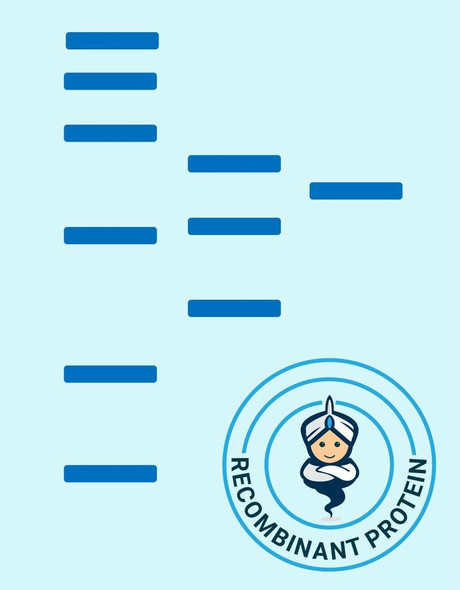Human PRL-2/PTP4A2 Recombinant Protein (RPES2625)
- SKU:
- RPES2625
- Product type:
- Recombinant Protein
- Host species:
- E.coli
- Reactivity:
- Human
Frequently bought together:
Description
system_update_alt데이터시트
Human PRL-2/PTP4A2 Recombinant Protein
PTP4A2, also known as PRL2 or PTPCAAX2, is short for Protein tyrosine phosphatase type IVA 2. This protein exists in cell membrane, cytoplasm,endosome and membrane. PTP4A2 is often farnesylated during post-translational modification. Farnesylation is required for membrane targeting and for interaction with RABGGTB. The unfarnesylated forms are redirected to the nucleus and cytosol. It can stimulate progression from G1 into S phase during mitosis and promotes tumors. It also inhibits geranylgeranyl transferase type II activity by blocking the association between RABGGTA and RABGGTB.
| Product Name: | Human PRL-2/PTP4A2 Recombinant Protein (RPES2625) |
| Product Code: | RPES2625 |
| Size: | 10µg |
| Species: | Human |
| Expressed Host: | E.coli |
| Synonyms: | Protein tyrosine phosphatase type IVA 2,PTP4A2,HU-PP-1,OV-1,PTP(CAAXII),Protein-tyrosine phosphatase 4a2,Protein-tyrosine phosphatase of regenerating liver 2,PRL-2,HH13,HH7-2,HMT,HNMT-S1,HNMT-S2,HU-PP-1,OV-1,PRL-2,PRL2,ptp-IV1a,ptp-IV1b,PTP4A,PTPCAAX2 |
| Accession: | Q12974 |
| Sequence: | Met 1-Gln167 |
| Fusion tag: | C-6His |
| Endotoxin: | <1.0 EU per µg as determined by the LAL method. |
| Protein Construction: | Recombinant Human Phosphatase of Regenerating Liver 2 is produced by our E.coli expression system and the target gene encoding Met1-Gln167 is expressed with a 6His tag at the C-terminus. |
| Purity: | > 90 % as determined by reducing SDS-PAGE. |
| Mol Mass: | 20.2 kDa |
| AP Mol Mass: | 18 kDa |
| Formulation: | Lyophilized from a 0.2 µm filtered solution of PBS, pH7.4. |
| Shipping: | This product is provided as lyophilized powder which is shipped with ice packs. |
| Stability and Storage: | Lyophilized proteins are stable for up to 12 months when stored at -20 to -80°C. Reconstituted protein solution can be stored at 4-8°C for 2-7 days. Aliquots of reconstituted samples are stable at < -20°C for 3 months. |










